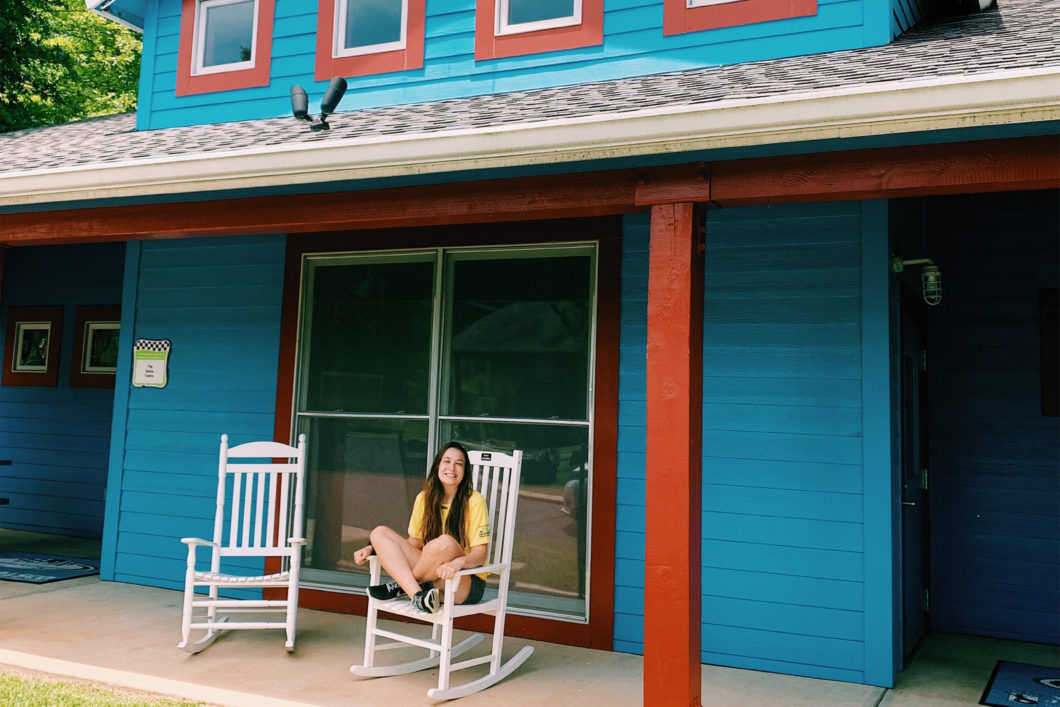Everyone has their own path to the speech, language, and hearing world, and it’s important to recognize every path is different. Some students attend a program specifically tailored to communication sciences and disorders (CSD), whereas others may have a background in linguistics or psychology.
No matter what you’re majoring in, I believe everyone should take that step towards gaining leadership experiences. It’s easy to get caught up in the idea that you need to do this to grow your resume in preparation for grad school—but don’t let that be your focus! Instead, focus on helping yourself grow as a leader—through actual, hands-on experience.
1. Knock on Every Single Door of Opportunity
Working up the courage to take on leadership opportunities is incredibly daunting. However, I discovered that doing the things that scare us can turn out to be the most rewarding experiences—and serve us well in our careers. Opportunities don’t usually fall into your lap; they stem from actively searching the Internet and reaching out to professionals. That’s how I found most of my opportunities!
Over the summer of my junior year, I knew I wanted to gain hands-on experience working with children who had disabilities. I challenged myself to volunteer at Camp Victory Junction in North Carolina. I worked as a cabin counselor for a week, serving children with cerebral palsy. I had the time of my life! Did I sing a lot of Disney songs, have dance parties, take part in cabin chats, and get pied in the face? YES! But I also heard personal stories from children who said they wanted more respect from people—they felt like others judged their intelligence because they used an augmentative and alternative communication (AAC) device.
As future audiologists; speech-language pathologists; and speech, language, and hearing scientists, we must recognize that gaining leadership experiences which allows us to see a new perspective is crucial to gaining a stronger understanding of how to be an advocate.
My lesson learned . . . Don’t wait for the opportunities to come knocking on your door: Seek them out yourself.
2. Research Isn’t Scary
Research plays a large role in the CSD discipline. However, students sometimes view research as a large mountain they’re not ready to climb. Don’t be afraid to climb that mountain!
In the spring of my junior year, I was able to work one-on-one with a professor (shoutout to Dr. Arianna Rigon), and we took baby steps into research. Now, I’m working with another professor (thank you, Professor Kelly Rutherford) who, because of my prior experience, is trusting me to be the co-investigator in a research project. Professors are understanding. They recognize research can be scary if you’re new to it. Having an open conversation with your professors about how they can guide you will go a long way.
3. Ask for Accommodations
One thing I’ve struggled with throughout my college experience is knowing when to ask for accommodations. I have profound hearing loss in my right ear and I’ve worn hearing aids since the 4th grade. However, I still struggle with asking professors to repeat themselves if I don’t hear them because of all the background noise from their computer with virtual classes. When that happens, I often wonder, “Is it just me? Are others experiencing this, too?”
Look into your school’s disability services, your state’s vocational rehabilitation programs, and other forms of support. It’s a great way to grow. In order to be an advocate and leader for other people, we must first learn how to advocate for ourselves and our own needs.
4. Go National
As a senior in the undergraduate program at Marshall University, I’m the 2020–2021 Marshall University NSSLHA President, as well as the Marshall University Student Representative for the West Virginia Speech-Language-Hearing Association (WVSHA). Although I love serving West Virginia, I’ve always known I wanted to serve a wider population. That’s what led me to apply to be a National NSSLHA Student State Officer (SSO).
Being able to serve as my state’s SLP SSO has been very rewarding; I’m working with students from all over the nation. This position has allowed me to build a network of professional contacts, meet others who are passionate about the profession, and grow as a leader. As an SSO, I’m also learning what other states and universities are doing with their NSSLHA chapters. If you’re interested in volunteering and getting involved with National NSSLHA, check out their Student Leadership page! They have amazing leadership opportunities for students!
5. Start NOW!
Although COVID-19 has brought many opportunities to a halt, there are still many ways for you to get involved and strengthen your leadership abilities. Maybe this means enrolling as a work-study student (serving your academic department) or sending an email to that professor you connect with and asking if they’d like to take you under their wing for research. Whatever it is, I hope you’re able to grow as a leader.
What are you waiting for? Start knocking on those doors of opportunity—right now!

